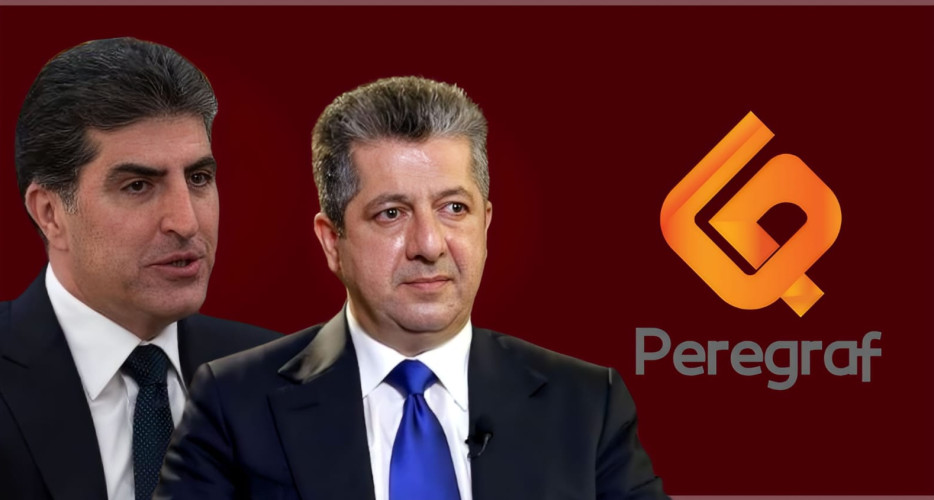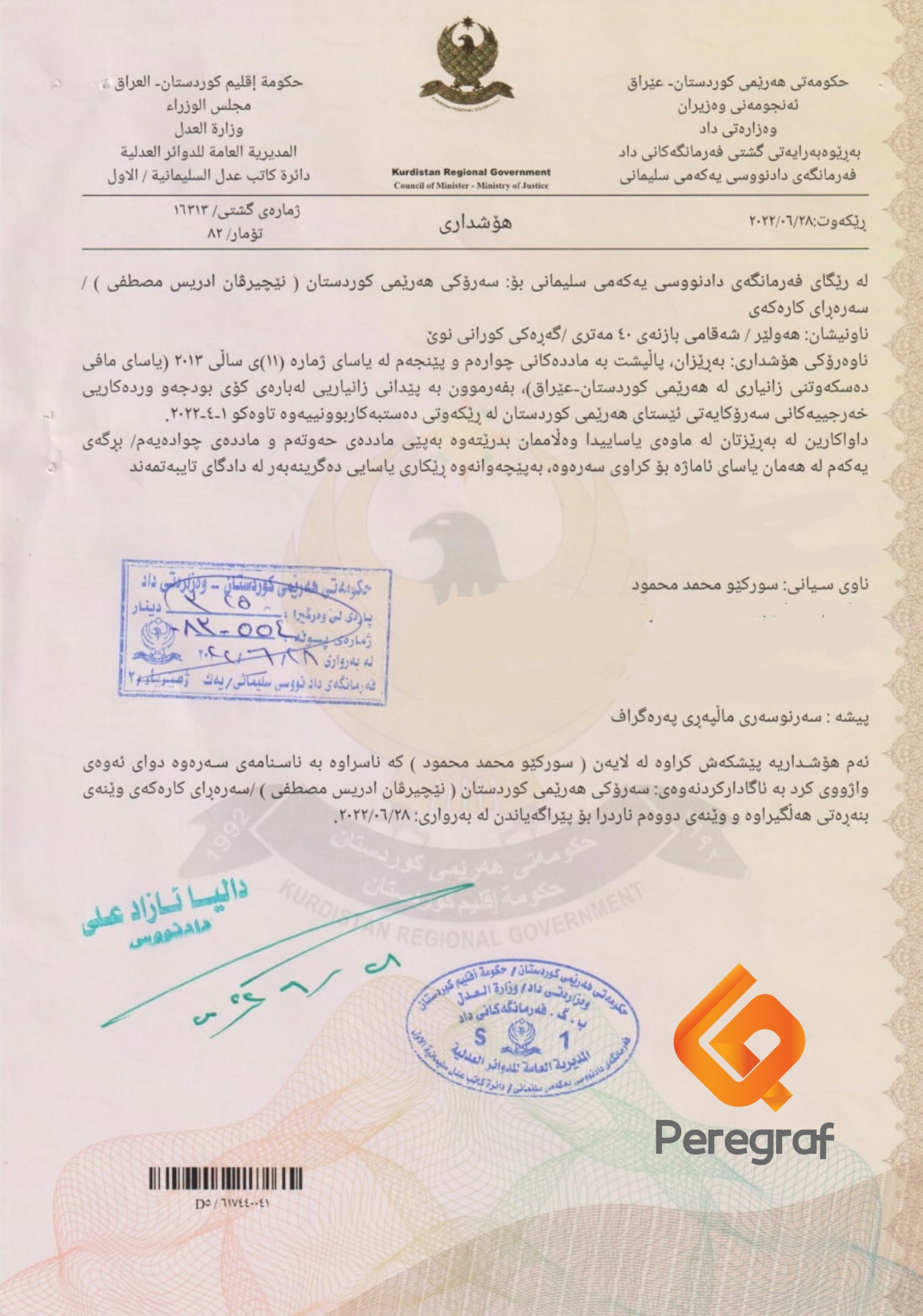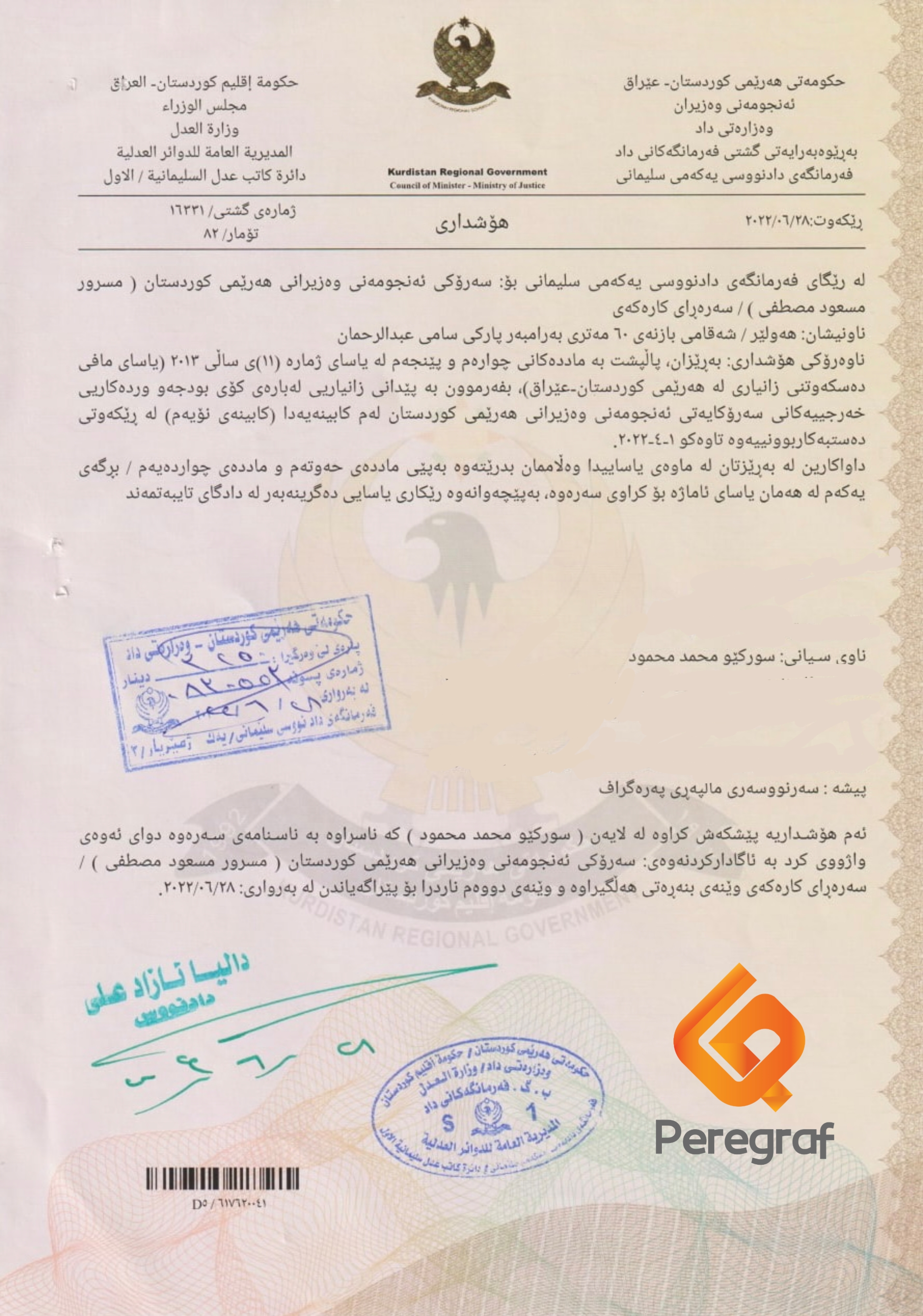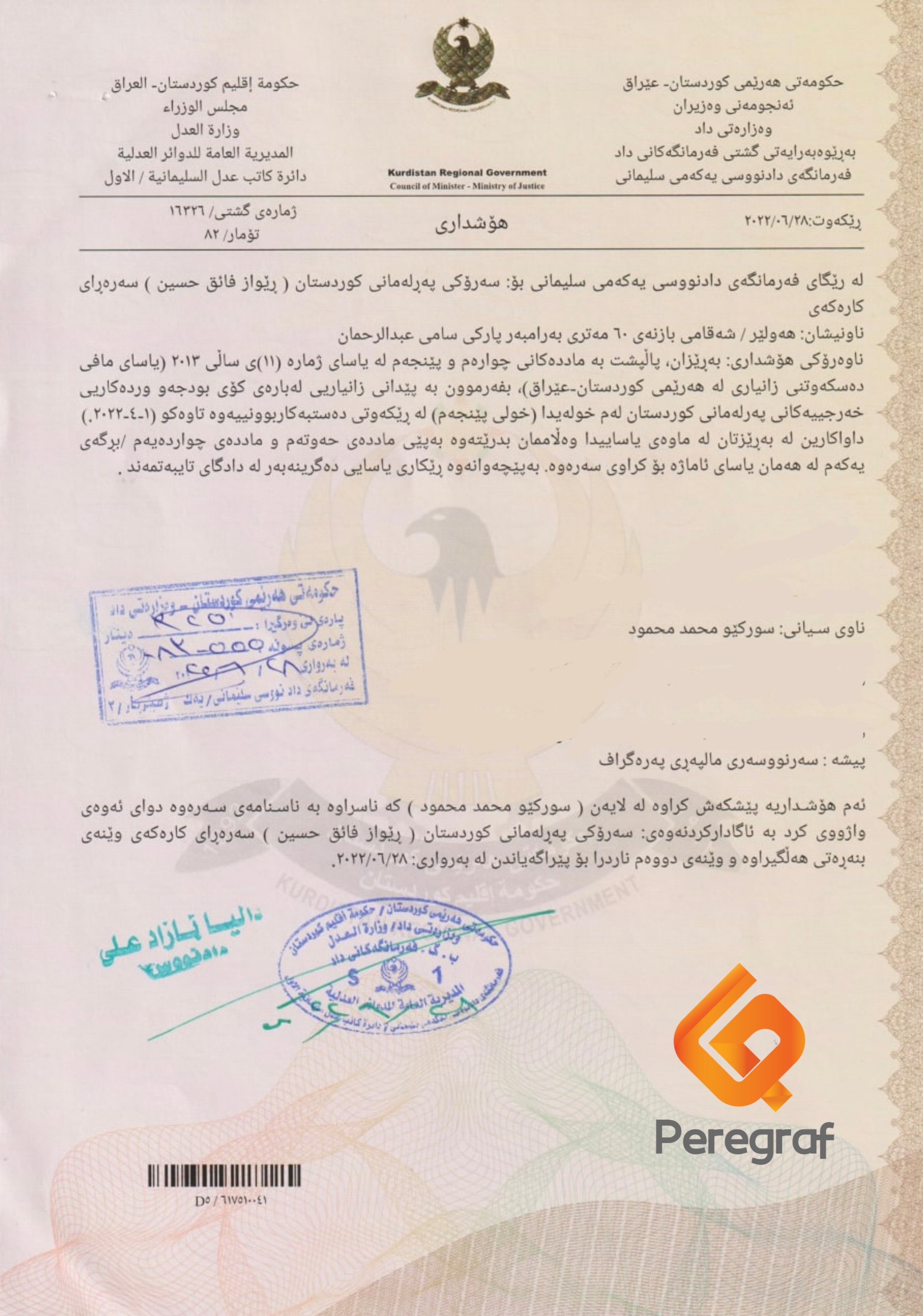The Erbil court dismissed Peregraf’s lawsuits against Nechirvan Barzani and Masrour Barzani on procedural grounds

PEREGRAF
The Erbil court rejected two lawsuits filed by the Peregraf against the Kurdistan Region President Nechirvan Barzani, KRG Prime Minister Masrour Barzani on "very weak" procedural grounds that are contrary to the spirit of the right to obtain information.
The lawsuits were filed under the Right to Obtain Information Act due to the Kurdish Authorities’ failure to provide information about the budget and expenditure details of the Kurdistan Region’s Presidency and the Kurdistan Regional Government (KRG).
The decision of the Erbil court comes after a time when the Peregraf’s Editor-in-chief in November 2022 won a lawsuit against the speaker of the Kurdistan Parliament in the Sulaymaniyah Court by adopting the same procedural and substantive measures.
The seventh hearing of the lawsuits was held in the 6th Preliminary Court in Erbil on January 5th 2023, in the presence of the Paragraf’s Editor-in-chief of, his lawyer and the lawyers of the Kurdistan Region President and the Kurdish Prime Minister. The judge decided to drop both lawsuits on the same day, but did not disclose the contents of the decree until 8th January 2023 and Peregraf was informed through a written letter regarding the result of the lawsuits.
Lawyer Karzan Fazel from the Organization for the Development of Democracy and Human Rights (DHRD), representing Peregraf for the lawsuits, said the Erbil court rejected the lawsuits procedural that opens many doors for legal concerns and serious criticism.
"I wish the decision was more in-depth, convincing, and in the interest of the content of the Right to Information Law. Therefore, we appeal against both decisions and hope that the Court of Appeal will correct them" Karzan told Peregraf.
Court’s excuses for rejecting the lawsuits
In his decision, the judge cited several reasons why Peregraf's lawsuits were formally rejected.
As a reason for rejecting the requests, the judge has claimed that Peregraf "did not ask for details" in the request for information.
"How does this concern the court? It was supposed to be the respondent who makes such a claim. Peregraf’s requests clearly and boldly ask the respondent to provide information about the total budget and details of expenditures of this term of the Presidency and the government from the date of working until April 1, 2022." Said Peregraf’s lawyer.

In another part of the decision, the judge said that the conditions of the warning are incomplete and it is unclear whether the warning has been received or not, and the positions of those who received the warning from the presidency and the government are unclear and it is also not known whether they are suitable to receive such warnings.
Peregraf's lawyer replied: The judge did not specify what the terms of the warning are and which are incomplete. The court's decision comes at a time when the warnings were sent from the clerk's office and sent through the Ministry of Justice.
In another point of his decision, the judge said that Peregraf "did not observe the periods specified in the law" in filing his lawsuit, without giving any explanation as to why the legal period was not observed.
"The court's decision is contrary to the legal texts. The defendant must speak on the formal issue and request to reject it. In both cases, the defendants only said that the lawsuits were filed outside the legal period Where and why are we outside the legal period? This was not mentioned. They have not responded to the lawsuit after 10 days, and according to the law, a lawsuit can be filed after 10 days without receiving any response. The court should not have made this legal mistake."
The Legal Period of Cases
In mid-May 2022, the editor-in-chief of Peregraf sent a letter to the Kurdistan Regional Government and the parliament to provide information about their budgets and expenditures. They did not officially register or provide any evidence that they had been asked for information.
Therefore, he resorted to the sending a warning the Ministry of Justice’s Sulaymaniyah’s notary office, so that they can convey the request for information through their representatives and document the process step by step.
On June 28, 2022, the editor-in-chief of Peregraf sent a letter to the office of the Presidency of the Kurdistan Regional Government, the office of the Council of Ministers, and the Kurdistan Parliament through the Sulaymaniyah Notary Office, requesting the budget and details of their expenditures according to the Right to Information Act.

On July 21, 2022, the request for information reached the Presidency of the Kurdistan Regional Government through the Ministry of Justice, and on July 24, 2022, reached the Presidency of the Council of Ministers.
In the sixth hearing held on December 15, 2022, the prime minister's lawyer requested the rejection of the lawsuit and submitted a letter to the court stating that "the lawsuit was filed outside the legal period of seven days. It is similarly filed 10 days after the warning was issued". The lawyer representing the Kurdistan President also made the same request stating that "the lawsuit has been filed following seven days which falls outside the legal period."
But were the lawsuits filed outside the statute of limitations? According to Article 7 of the Right to Information Act, they were required to respond within 10 days of receiving the warning, but none of them responded within the legal deadline.
According to Article 17 of the same law, after the expiry of the period specified for a response, the requester of information may file a lawsuit in court within a period not exceeding seven days.
15 days after receipt of the request for information to the Presidency of the Kurdistan Region and 12 days after receipt of the Presidency of the Council of Ministers, none of them responded. This is why Peregraf took the case to court and on August 4, 2022, filed a lawsuit against the president and the prime minister in the Sulaimani court.
The lawyers of the Kurdistan Regional Government President and the Prime Minister did not attend the first hearing held on June 9, 2022 in Sulaimani Court. They attended the second hearing on 4-10-2022 and requested that the cases be transferred from Sulaimani to Erbil Court.
The dismissal of the lawsuits by Erbil Court is coincidental with contrasting decree issued by Sulaimaniyah Court after the similar lawsuit filed by Peregraf against the Speaker of the Kurdistan Parliament Rewaz Fayaq in accordance with the same law and the same procedural and substantive measures. On 10 November, 2022, in a landmark decision, the Sulaymaniyah court ruled in favor of Peregraf’s Editor-in-Chief and obligated the defendant to provide all the data and information referred to in the lawsuit. Speaker Fayaq appealed the decision and the appeal decision has not yet been issued.

The Right to Information Law was passed in the Kurdistan Region in 2013, but the Kurdistan Regional Government has not yet issued guidelines for the implementation of the law by government institutions.
The ninth cabinet, led by Masrour Barzani, claims to be better than previous cabinets in terms of freedom, transparency, and human rights, but the reality says something different, especially regarding the rights of journalists, dealing with the media, and providing information.
Journalists have difficulty accessing information and statements from government officials. Peregraf has repeatedly asked the KRG spokesman for information and statements on various issues, but he has not responded.
According to the Right to Information Law, everyone has the right to access information and documents requested from the institutions, except for those excluded from Article 14 of the Act and disclosed after 20 years; Security and defense secrets and negotiations between the region and other parties, personal information and files and information whose disclosure affects the course of investigation and prosecution or causes a violation of competition and intellectual property rights.
What does the Peregraf’s editor-in-chief say?
Surkew Mohammed, editor-in-chief of Peregraf, talks about the steps taken to request information, legal processes, and court decisions:
The content of the information we have requested is an examination of the regional presidencies on three important issues that they constantly emphasize, namely; providing information to journalists, complying with law enforcement and transparency.
The Three Presidencies of the Kurdistan Region failed the test. They did not give us the information, nor did they implement the law, nor did they prove their transparency, as we have sought information over their budget and expenditures during this term of office. KRG has functioned without a formal budget for 10 years, therefore, financial planning and spending became completely opaque and arbitrarily. We would like to be familiar with nature and the amount of public funds spent by the Kurdistan Region Presidencies!
After it turned out that the presidencies failed the test, we resorted to another authority, the judiciary, and took the legal path according to provisions of the law passed by the before-mentioned authorities themselves.
Many people tell us that our efforts are in vain. Others laugh at us and say, "Do you really think you can win against them in court? They are everything themselves".
We hope that the judges will maintain their impartiality, and apply the law to everyone and that justice will be established, but this is only a hope. The decision of the Erbil court worried us very much, not because it was not in our interest, but because it does not fit the spirit of the law on providing information and its justifications are very vague and weak.
After the court's decision, it is now unclear what we did wrong in the legal process so that we can take the right path again and not repeat that mistake. We are appealing and hope that the Court of Appeal will correct the mistake.
The question for the honorable Judge is; Why didn't she decide in such a manner which is in the public interest, on the grounds of transparency, and implementation of an important law?
As for the Kurdistan Regional Presidencies; we would like to tell you that we have come step by step to implement the law on providing information. You have not kept your promises. We still do not know how much your budget and expenditures are. Please reveal to the public the information that you have passed a law for.